You may well have noticed we've a new book in the works. As mentioned earlier, Congregation of Innocents takes its inspiration from the late great Shirley Jackson who passed away fifty years ago this year.
One writer who is a fan of Jackson's work, and has in the past provided an introduction to a selection of her stories, is the also great Patrick McGrath. A British writer who now lives in New York, McGrath seemed to us an entirely perfect choice for someone for us to approach to write an introduction for our book which takes the uncanny as its tone and America as a key theme, or rather British imaginings of America.
It’s also very exciting. McGrath has been one of my favourite writers since I first encountered Asylum as a teenager, and I'm thrilled to be sharing space with him in a book I’ve been involved in putting together.
Perhaps you’ve been meaning to read one of his novels and aren’t sure where to begin. Or maybe you read Asylum and don’t know which novel to read next. Or maybe you’ve never read any Patrick McGrath and don't know a single thing about him. In any case, below is my entirely subjective selection of his five best books.
As you’ll see, it’s pretty much impossible to talk about Patrick McGrath without talking about the gothic, that much-loved and yet much-maligned aesthetic which revels, frequently with great theatre and pomp, in death, terror and all that's unnatural. But as well as the obvious stuff – big spooky old buildings, hunchbacked butlers, that sort of thing – the gothic is also about the mechanics of haunting, the ways in which the past can impact upon and interact with the present. What, for me, sets McGrath apart as a writer is not only his use of gothic – and his evident relish – but that he takes it seriously. Yes, there are foggy marshlands, decrepit backdrops and perilous journeys through the treacherous night, but these come paired with an incisive interest in aberrant pathology, repressed sexuality and unreliable narrators, all of which are put to work creating some of the most engaging, intelligent and entertaining fiction I've read.
One writer who is a fan of Jackson's work, and has in the past provided an introduction to a selection of her stories, is the also great Patrick McGrath. A British writer who now lives in New York, McGrath seemed to us an entirely perfect choice for someone for us to approach to write an introduction for our book which takes the uncanny as its tone and America as a key theme, or rather British imaginings of America.
It’s also very exciting. McGrath has been one of my favourite writers since I first encountered Asylum as a teenager, and I'm thrilled to be sharing space with him in a book I’ve been involved in putting together.
Perhaps you’ve been meaning to read one of his novels and aren’t sure where to begin. Or maybe you read Asylum and don’t know which novel to read next. Or maybe you’ve never read any Patrick McGrath and don't know a single thing about him. In any case, below is my entirely subjective selection of his five best books.
As you’ll see, it’s pretty much impossible to talk about Patrick McGrath without talking about the gothic, that much-loved and yet much-maligned aesthetic which revels, frequently with great theatre and pomp, in death, terror and all that's unnatural. But as well as the obvious stuff – big spooky old buildings, hunchbacked butlers, that sort of thing – the gothic is also about the mechanics of haunting, the ways in which the past can impact upon and interact with the present. What, for me, sets McGrath apart as a writer is not only his use of gothic – and his evident relish – but that he takes it seriously. Yes, there are foggy marshlands, decrepit backdrops and perilous journeys through the treacherous night, but these come paired with an incisive interest in aberrant pathology, repressed sexuality and unreliable narrators, all of which are put to work creating some of the most engaging, intelligent and entertaining fiction I've read.
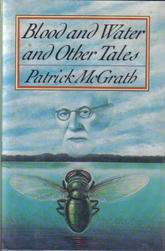
1. Blood and Water and Other Tales (1989)
'One fresh and gusty day in the damp autumn of her twelfth year Evelyn found a lost explorer in the garden of her parents’ London home. He was lying in a mall tent beneath a mosquito net so torn and gaping as to be quite inadequate, were there aby mosquitoes to protect him from.' (from 'The Lost Explorer')
McGrath’s first book and the one with which he made something of a name for himself, Blood and Water forms a kind of preliminary handbook for the stylistic hallmarks which he has since become known for. As well as a distinctive prose which is all his own – rolling passages peppered with abrupt terminations and shocking flourishes, but marked too with precision and, above all, control – also abundant in this collection of stories is his strong taste for seaminess and morbidity, and a dominating interest in history, particularly that of the Empire-era: colonial explorers, the Raj and the Congo, captured monkey specimens, all these have their place in Blood and Water. But the vibe of the collection is predominantly an entertaining one. These recherché (and, in the mid 80's, entirely unfashionable) aspects of eras bygone are appraised with an eye which allows for a generous amount of humour and outright silliness (one of the stories is narrated by a fly, another a boot).
'One fresh and gusty day in the damp autumn of her twelfth year Evelyn found a lost explorer in the garden of her parents’ London home. He was lying in a mall tent beneath a mosquito net so torn and gaping as to be quite inadequate, were there aby mosquitoes to protect him from.' (from 'The Lost Explorer')
McGrath’s first book and the one with which he made something of a name for himself, Blood and Water forms a kind of preliminary handbook for the stylistic hallmarks which he has since become known for. As well as a distinctive prose which is all his own – rolling passages peppered with abrupt terminations and shocking flourishes, but marked too with precision and, above all, control – also abundant in this collection of stories is his strong taste for seaminess and morbidity, and a dominating interest in history, particularly that of the Empire-era: colonial explorers, the Raj and the Congo, captured monkey specimens, all these have their place in Blood and Water. But the vibe of the collection is predominantly an entertaining one. These recherché (and, in the mid 80's, entirely unfashionable) aspects of eras bygone are appraised with an eye which allows for a generous amount of humour and outright silliness (one of the stories is narrated by a fly, another a boot).
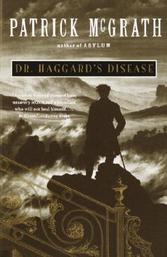
2. Dr Haggard's Disease (1993)
'I frowned. Probably neurotic. Not enough sex, not enough love, too much quiet desperation. She was drying up like a forgotten apple in a neglected bowl. Impossible, I reflected, to fathom the hell that existed behind the façade of an English marriage – hadn’t I seen the example of your parents?'
McGrath’s first novel, The Grotesque, was in many ways a continuation of the preoccupations found in the stories in Blood and Water: elements of the gothic proliferate – an ancient mansion slowly crumbles, bones are unearthed, vengeance fester – all of which are enjoyable and of course beautifully written, but there’s little effort made to unite or explain their presence. This sort of thing works well in short stories, but only just about works with a short novel. With Spider and in particular with Dr Haggard’s Disease McGrath’s taste for squalour and macabre find their place within increasingly tightly structured novels. The latter takes the form of a one-sided conversation, with the a semi-retired doctor – the ramshackle, morphine-dependant Edward Haggard – relating to the son of Fanny Vaughn, the woman he once loved, what forced him to move from pre-Blitz London to a dank, rundown manor. In due course, the doctor’s obsession with Fanny diverges into muddier waters, his romantic and the erotic urges growing at first incapacitating and then warped and then unspeakable. As well as deploying his usual creepy ornamentations, Dr Haggard’s Disease is also the novel in which McGrath embarks on what has earned him something of a reputation as a writer’s writer, with his interplay between the tale and its telling creating a beguiling, hypnotic effect.
'I frowned. Probably neurotic. Not enough sex, not enough love, too much quiet desperation. She was drying up like a forgotten apple in a neglected bowl. Impossible, I reflected, to fathom the hell that existed behind the façade of an English marriage – hadn’t I seen the example of your parents?'
McGrath’s first novel, The Grotesque, was in many ways a continuation of the preoccupations found in the stories in Blood and Water: elements of the gothic proliferate – an ancient mansion slowly crumbles, bones are unearthed, vengeance fester – all of which are enjoyable and of course beautifully written, but there’s little effort made to unite or explain their presence. This sort of thing works well in short stories, but only just about works with a short novel. With Spider and in particular with Dr Haggard’s Disease McGrath’s taste for squalour and macabre find their place within increasingly tightly structured novels. The latter takes the form of a one-sided conversation, with the a semi-retired doctor – the ramshackle, morphine-dependant Edward Haggard – relating to the son of Fanny Vaughn, the woman he once loved, what forced him to move from pre-Blitz London to a dank, rundown manor. In due course, the doctor’s obsession with Fanny diverges into muddier waters, his romantic and the erotic urges growing at first incapacitating and then warped and then unspeakable. As well as deploying his usual creepy ornamentations, Dr Haggard’s Disease is also the novel in which McGrath embarks on what has earned him something of a reputation as a writer’s writer, with his interplay between the tale and its telling creating a beguiling, hypnotic effect.
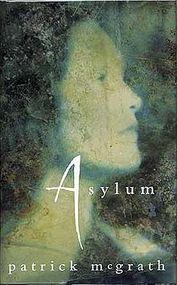
3. Asylum (1996)
‘Stella realised then that Charlie's unhappiness had locked him out of this community as effectively as hers had, and she felt a dull sense of confirmation, she felt she might have known, this is the nature of people, they unerringly select as their victim the one who most needs their warmth.’
There’s a brief explanation regarding the genesis of this, probably still McGrath’s best known novel, in a recent autobiographical piece about growing up in and around Broadmoor, the lunatic asylum, as it was then called, where his father worked as Medical Superintendent:
I remember once coming into a roomful of grown-ups, and silence suddenly descending. This is catnip to a curious boy. I never did get the whole story, but it seems a doctor's wife had been "compromised" by one of the men on a working party. The patient lost all his privileges; what happened to the wayward wife I don't know—the family moved away soon after. But I did know enough that when, years later, I was groping around for an idea for a book, I thought of it, and wrote a novel called Asylum on the basis of it, using my imagination to fill in the blanks.
That 'using my imagination' seems a modest understatement for what is evidently a carefully planned novel. The main thrust of Asylum concerns Stella, a bored housewife who becomes infatuated with Edgar, a brilliant artist and patient at the maximum security psychiatric hospital where her husband works as deputy superintendent. There is high drama in the guise of the ensuing scandalous fallout, a daring escape and a tragic, merciless conclusion. Most effectively, there’s also McGrath’s by now trademark narrative trickery. All the events are related second-hand by Peter Cleave, a senior psychiatrist at the same hospital. As the novel progresses the reader begins to question Cleave's motives and even the story he relays. Its mixture of readability and intelligence gives the novel the feel of a Booker winner, so it’s surprising to learn that Asylum never won a single award when it came out in 1996. A film adaptation was made in 2005 but it’s a rather pale replication of its source novel (although the author himself does make a brief cameo). As McGrath points out in his memoir, both the book and the childhood experiences which generated it have come to dominate how he is perceived: ‘I've never been interviewed about my work without Broadmoor coming up; but as a small boy you tend not to think about whether you're having an unusual childhood. You have far more pressing matters to attend to.’
‘Stella realised then that Charlie's unhappiness had locked him out of this community as effectively as hers had, and she felt a dull sense of confirmation, she felt she might have known, this is the nature of people, they unerringly select as their victim the one who most needs their warmth.’
There’s a brief explanation regarding the genesis of this, probably still McGrath’s best known novel, in a recent autobiographical piece about growing up in and around Broadmoor, the lunatic asylum, as it was then called, where his father worked as Medical Superintendent:
I remember once coming into a roomful of grown-ups, and silence suddenly descending. This is catnip to a curious boy. I never did get the whole story, but it seems a doctor's wife had been "compromised" by one of the men on a working party. The patient lost all his privileges; what happened to the wayward wife I don't know—the family moved away soon after. But I did know enough that when, years later, I was groping around for an idea for a book, I thought of it, and wrote a novel called Asylum on the basis of it, using my imagination to fill in the blanks.
That 'using my imagination' seems a modest understatement for what is evidently a carefully planned novel. The main thrust of Asylum concerns Stella, a bored housewife who becomes infatuated with Edgar, a brilliant artist and patient at the maximum security psychiatric hospital where her husband works as deputy superintendent. There is high drama in the guise of the ensuing scandalous fallout, a daring escape and a tragic, merciless conclusion. Most effectively, there’s also McGrath’s by now trademark narrative trickery. All the events are related second-hand by Peter Cleave, a senior psychiatrist at the same hospital. As the novel progresses the reader begins to question Cleave's motives and even the story he relays. Its mixture of readability and intelligence gives the novel the feel of a Booker winner, so it’s surprising to learn that Asylum never won a single award when it came out in 1996. A film adaptation was made in 2005 but it’s a rather pale replication of its source novel (although the author himself does make a brief cameo). As McGrath points out in his memoir, both the book and the childhood experiences which generated it have come to dominate how he is perceived: ‘I've never been interviewed about my work without Broadmoor coming up; but as a small boy you tend not to think about whether you're having an unusual childhood. You have far more pressing matters to attend to.’
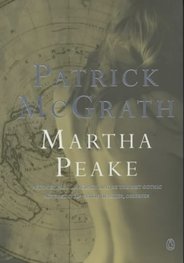
4. Martha Peake: A Novel of the Revolution (2000)
‘It is a black art, the writing of a history, is it not? – to resurrect the dead, and animate their bones, as historians do? I think historians must be melancholy creatures, rather like poets, perhaps, or doctors; but then, what does it matter what I think. This is not my story.’
Of all the books listed here, Martha Peake is perhaps my favourite. It’s probably McGrath’s most entertaining work, and feels to me the most ‘pure Patrick McGrath’. The transatlanticism is brought to the fore, with events weaving between 1760's London to revolutionary America; the gothic is in fine fettle, with events taking place in Drogo Hall, the author’s most dilapidated estate yet, isolated in a fog-blinded marsh and occupied by a sinister anatomist and his mute butler; the same goes for the book’s historical aspect: 18th century London’s sawdust pubs and stinking alleyways are Hogarthian in both detail and redolence, the plot folding in neatly with real-world events when the story shifts to colonial Massachusetts. Present too is the spooky second-hand (or third- or perhaps fourth-hand) account of what takes place: our narrator is literally nestled up beside a blazing coal fire to hear his ancient uncle tell the tale of Harry Peake, a disfigured west-coast smuggler whose devotion to his daughter Martha is outweighed only by his chronic addiction to cheap booze. Following a bout of mania, Martha flees for the States and a life in service of the burgeoning mutiny against the English. As with Asylum, I’m aware that summarising McGrath’s plot risks making the novel sound a tad suspect, as though I may have simply enjoyed an overwrought melodrama about a Cornish smuggler and allowed myself to get a little carried away. But along with a knowing saga-esque sensibility, Martha Peake is informed by an intelligence, not just in the novel’s formidable structure, but in the confidence and seriousness with which it interrogates what it means to be an American.
‘It is a black art, the writing of a history, is it not? – to resurrect the dead, and animate their bones, as historians do? I think historians must be melancholy creatures, rather like poets, perhaps, or doctors; but then, what does it matter what I think. This is not my story.’
Of all the books listed here, Martha Peake is perhaps my favourite. It’s probably McGrath’s most entertaining work, and feels to me the most ‘pure Patrick McGrath’. The transatlanticism is brought to the fore, with events weaving between 1760's London to revolutionary America; the gothic is in fine fettle, with events taking place in Drogo Hall, the author’s most dilapidated estate yet, isolated in a fog-blinded marsh and occupied by a sinister anatomist and his mute butler; the same goes for the book’s historical aspect: 18th century London’s sawdust pubs and stinking alleyways are Hogarthian in both detail and redolence, the plot folding in neatly with real-world events when the story shifts to colonial Massachusetts. Present too is the spooky second-hand (or third- or perhaps fourth-hand) account of what takes place: our narrator is literally nestled up beside a blazing coal fire to hear his ancient uncle tell the tale of Harry Peake, a disfigured west-coast smuggler whose devotion to his daughter Martha is outweighed only by his chronic addiction to cheap booze. Following a bout of mania, Martha flees for the States and a life in service of the burgeoning mutiny against the English. As with Asylum, I’m aware that summarising McGrath’s plot risks making the novel sound a tad suspect, as though I may have simply enjoyed an overwrought melodrama about a Cornish smuggler and allowed myself to get a little carried away. But along with a knowing saga-esque sensibility, Martha Peake is informed by an intelligence, not just in the novel’s formidable structure, but in the confidence and seriousness with which it interrogates what it means to be an American.
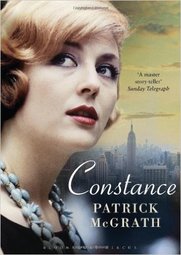
5. Constance (2013)
'My name is Constance Schuyler Klein. The story of my life begins the day I married an Englishman called Sidney Klein and said goodbye forever to Ravenswood and Daddy and all that went before. I have a husband now, I thought, a new daddy.'
McGrath’s most recent novel received praise of the somewhat guarded variety when it was first published. I suppose it’s not difficult to see why: his hallmark grand guignol gothic was refashioned in Trauma, his previous novel, into a more psychologically intricate realism, a theme which is continued in Constance. Here, the narrative switches between two first-person accounts of a difficult, complex relationship: Sidney, an English academic, and the enigmatic title character Constance, a New Yorker whom he meets at a party in the 1960’s and pursues; in doing so he uncovers details about her dead mother and a difficult relationship with her sister and their secretive father. I came to appreciate Constance when I was in New York a couple of years ago and made a point of stopping off at the KGB Bar to see McGrath read from the book. Something which his performance highlighted that I’d not really noticed when first reading the novel was that Constance is actually quite funny. Funny isn’t necessarily something a recent reader of Asylum will be on the lookout for, but interlaced with this novel’s Freudian tragedy there’s a keenly observed comedy of transatlantic manners. In fact, McGrath’s key theme throughout nearly all his books is the lies people tell to themselves to convince themselves they are happy. And what’s funnier than that?
Richard Hirst
Congregation of Innocents: Five Curious Tales, featuring an introduction by Patrick McGrath, is available to pre-order now.
'My name is Constance Schuyler Klein. The story of my life begins the day I married an Englishman called Sidney Klein and said goodbye forever to Ravenswood and Daddy and all that went before. I have a husband now, I thought, a new daddy.'
McGrath’s most recent novel received praise of the somewhat guarded variety when it was first published. I suppose it’s not difficult to see why: his hallmark grand guignol gothic was refashioned in Trauma, his previous novel, into a more psychologically intricate realism, a theme which is continued in Constance. Here, the narrative switches between two first-person accounts of a difficult, complex relationship: Sidney, an English academic, and the enigmatic title character Constance, a New Yorker whom he meets at a party in the 1960’s and pursues; in doing so he uncovers details about her dead mother and a difficult relationship with her sister and their secretive father. I came to appreciate Constance when I was in New York a couple of years ago and made a point of stopping off at the KGB Bar to see McGrath read from the book. Something which his performance highlighted that I’d not really noticed when first reading the novel was that Constance is actually quite funny. Funny isn’t necessarily something a recent reader of Asylum will be on the lookout for, but interlaced with this novel’s Freudian tragedy there’s a keenly observed comedy of transatlantic manners. In fact, McGrath’s key theme throughout nearly all his books is the lies people tell to themselves to convince themselves they are happy. And what’s funnier than that?
Richard Hirst
Congregation of Innocents: Five Curious Tales, featuring an introduction by Patrick McGrath, is available to pre-order now.

 RSS Feed
RSS Feed
